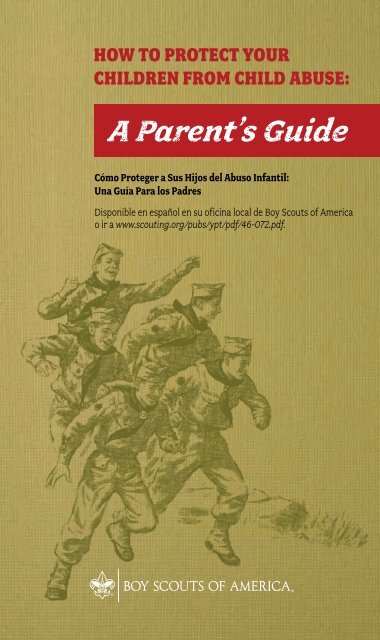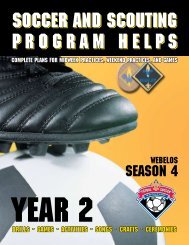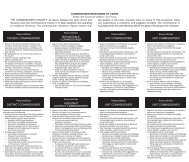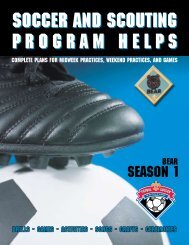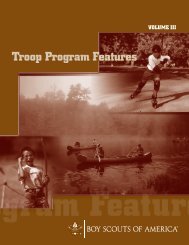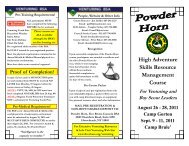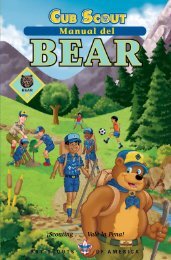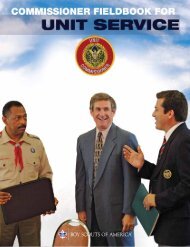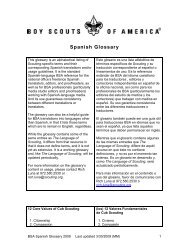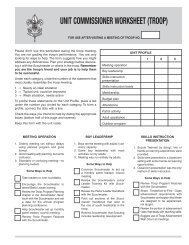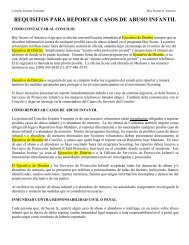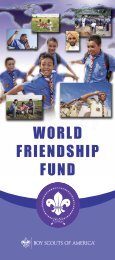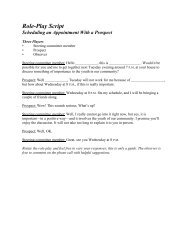A Parent's Guide - Boy Scouts of America
A Parent's Guide - Boy Scouts of America
A Parent's Guide - Boy Scouts of America
Create successful ePaper yourself
Turn your PDF publications into a flip-book with our unique Google optimized e-Paper software.
HOW TO PROTECT YOUR<br />
CHILDREN FROM CHILD ABUSE:<br />
A Parent’s <strong>Guide</strong><br />
Cómo Proteger a Sus Hijos del Abuso Infantil:<br />
Una Guía Para los Padres<br />
Disponible en español en su <strong>of</strong>icina local de <strong>Boy</strong> <strong>Scouts</strong> <strong>of</strong> <strong>America</strong><br />
o ir a www.scouting.org/pubs/ypt/pdf/46-072.pdf.
INTRODUCTION<br />
Our children are <strong>of</strong>ten faced with choices that affect their development<br />
and safety. As parents, we can do our best to provide education<br />
and guidance to prepare them to make the best decisions. One way we<br />
do this is to talk with our children. Some subjects are easy to discuss<br />
with them—sports, their grades in school, their friends, and many<br />
other features <strong>of</strong> our daily lives. Other things are more difficult for us to<br />
discuss, including child abuse—especially child sexual abuse.<br />
Although discussing child abuse with your children may be difficult<br />
for you, it is very important. Perhaps the most important step parents<br />
can take to protect their children from abuse is to have open communication<br />
in the home. Research has shown that children whose parents<br />
talk to them about preventing abuse are more effective at fending <strong>of</strong>f<br />
assaults. Your role is very important.<br />
More than 3 million reports <strong>of</strong> child abuse are received each year<br />
nationally, including half a million reports <strong>of</strong> child sexual abuse. As a<br />
major youth-serving organization, the <strong>Boy</strong> <strong>Scouts</strong> <strong>of</strong> <strong>America</strong> has a<br />
unique opportunity to help protect the youth <strong>of</strong> our nation. This booklet<br />
is designed to give you essential information that should help you<br />
teach your children how to protect themselves.<br />
If your son is a new <strong>Boy</strong> Scout, this might be the first time that<br />
you have seen this Parent’s <strong>Guide</strong>. If you have other sons in Scouting,<br />
or if your son has advanced in <strong>Boy</strong> Scouting, we hope that you<br />
are familiar with this guide and have discussed its contents with your<br />
children. In either case, we encourage you to make this information<br />
part <strong>of</strong> a continuing family effort that reinforces the concepts included<br />
in this guidebook.<br />
We do not expect that your son will become a victim <strong>of</strong> child abuse.<br />
It is extremely important, however, that if he is ever confronted with an<br />
abusive situation, he will know that there are adults in his life who will<br />
listen and respond in a supportive manner. The purpose <strong>of</strong> this booklet<br />
is to help you and your son establish, or reinforce, open communication<br />
on this sensitive topic.<br />
2 A Parent’s <strong>Guide</strong>
SECTION I. INFORMATION FOR PARENTS<br />
Youth Protection Joining Requirement:<br />
For your son to join a <strong>Boy</strong> Scout troop,<br />
he must complete the exercises included<br />
in Section II <strong>of</strong> this pamphlet.<br />
Using This Booklet<br />
This booklet is divided into two sections. The first section contains<br />
information about child abuse and provides some tips to help parents<br />
talk with their <strong>Boy</strong> Scout–age sons about child abuse. The second<br />
section is for you to share with your son. Some <strong>of</strong> the activities listed<br />
in the second section are requirements your son needs your help to<br />
complete before he can join his <strong>Boy</strong> Scout troop.<br />
It is important that you read the entire booklet before you and your<br />
son do any <strong>of</strong> the exercises together. You might be tempted to hand this<br />
booklet to your son and tell him to read it. We urge you to resist this<br />
temptation. Your son needs to know that he can openly discuss difficult<br />
topics with you.<br />
A Parent’s <strong>Guide</strong> 3
CHILD ABUSE:<br />
BASIC INFORMATION FOR PARENTS<br />
An abused or neglected child is a child who is harmed, or threatened<br />
with physical or mental harm, by the acts or lack <strong>of</strong> action <strong>of</strong> a person<br />
responsible for the child’s care. There are several forms <strong>of</strong> abuse: physical<br />
abuse, emotional abuse, and sexual abuse. Child neglect is a form <strong>of</strong> abuse<br />
that occurs when a person responsible for the care <strong>of</strong> a child is able, but<br />
fails, to provide necessary food, clothing, shelter, or care. Each state has its<br />
own definitions and laws concerning child abuse and child neglect.<br />
Child abuse and neglect are serious problems for our society. The<br />
number <strong>of</strong> cases reported has increased each year since 1976, when<br />
statistics were first kept. Brief discussions <strong>of</strong> each form <strong>of</strong> abuse are<br />
presented below.<br />
Neglect<br />
A child is neglected if the people this child depends on do not<br />
provide food, clothing, shelter, medical care, education, and supervision.<br />
When these basic needs are deliberately withheld, not because the parents<br />
or care givers are poor, it is considered neglect. Often parents or caregivers<br />
<strong>of</strong> neglected children are so overwhelmed by their own needs that they<br />
cannot recognize the needs <strong>of</strong> their children.<br />
4 A Parent’s <strong>Guide</strong>
Physical Abuse<br />
Physical abuse is the deliberate injury <strong>of</strong> a child by a person responsible<br />
for the child’s care. Physical abuse <strong>of</strong>ten stems from unreasonable<br />
punishment, or by punishment that is too harsh for the child. Sometimes<br />
it is the result <strong>of</strong> a caregiver’s reaction to stress. Drinking and drug<br />
abuse by caretakers have become more common contributing factors in<br />
physical abuse cases.<br />
Physical abuse injuries can include bruises, broken bones, burns,<br />
and abrasions. Children experience minor injuries as a normal part <strong>of</strong><br />
childhood, usually in predictable places such as the shins, knees, and<br />
elbows. When the injuries are in s<strong>of</strong>t-tissue areas on the abdomen or<br />
back, or don’t seem to be typical childhood injuries, physical abuse<br />
becomes a possibility.<br />
Physical abuse happens to children <strong>of</strong> all age groups; how ever, youth<br />
ages 12 to 17 have the highest rate <strong>of</strong> injury from physical abuse. This<br />
is possibly due to increasing conflict between parents and children as<br />
children become more independent.<br />
Emotional Abuse<br />
Emotional abuse is harder to recognize but is just as harmful to the<br />
child as other forms <strong>of</strong> abuse. Emotional abuse damages the child’s selfesteem<br />
and, in extreme cases, can lead to developmental problems and<br />
speech disorders. A child suffers from emotional abuse when constantly<br />
ridiculed, rejected, blamed, or compared unfavorably with brothers or<br />
sisters or other children.<br />
Expecting too much from the child in academics, athletics, or other<br />
areas is a common cause <strong>of</strong> emotional abuse by parents or other adults.<br />
When a child can’t meet these expectations, the child feels that he or she<br />
is never quite good enough.
Sexual Abuse<br />
When an adult or an older child uses his or her authority over<br />
a child to involve the child in sexual activity, it is sexual abuse, and<br />
that person is a child molester. The molester might use tricks, bribes,<br />
threats, or force to persuade the child to join in sexual activity. Sexual<br />
abuse includes any activity performed for the sexual satisfaction <strong>of</strong> the<br />
molester, including acts ranging from exposing his or her sex organs<br />
(exhibitionism), observing another’s sex organs or sexual activity (voyeurism),<br />
to fondling and rape.<br />
Here are a few facts you should know about child sexual abuse:<br />
X Child sexual abuse occurs to as many as 25 percent <strong>of</strong> girls and<br />
14 percent <strong>of</strong> boys before they reach 18 years <strong>of</strong> age.<br />
X <strong>Boy</strong>s and girls could be sexually abused at any age; however, most<br />
sexual abuse occurs between the ages <strong>of</strong> 7 and 13.<br />
X Children are most likely to be molested by someone they know<br />
and trust.<br />
X Eighty to 90 percent <strong>of</strong> sexually abused boys are molested by<br />
acquaintances who are nonfamily members.<br />
X Females perform 20 percent <strong>of</strong> the sexual abuse <strong>of</strong> boys under age<br />
14 (prepubescents).<br />
X Few sexually abused children tell anyone that they have been<br />
abused. Children are usually told to keep the abuse secret. This<br />
could involve threats, bribes, or physical force.<br />
X Children might feel responsible for the abuse and fear an angry<br />
reaction from their parents.<br />
6 A Parent’s <strong>Guide</strong>
Sexual Molestation by Peers<br />
Approximately one-third <strong>of</strong> sexual molestation occurs at the hands<br />
<strong>of</strong> other children. If your child tells you about club initiations in which<br />
sexual activity is included, or if your child tells you about inappropriate<br />
or tricked, pressured, or forced sexual activity by other children, this is a<br />
form <strong>of</strong> sexual abuse and you need to take steps to stop the activity. This<br />
kind <strong>of</strong> sexual misconduct is serious and should not be ignored.<br />
Children who molest other children<br />
need pr<strong>of</strong>essional help. They are<br />
much more likely to respond to treatment<br />
when young than are adults<br />
who were molesters as children and<br />
received no treatment, and continue<br />
to molest children as adults.<br />
Parents and other adults who<br />
work with children need to distinguish<br />
between sexual behavior<br />
that is a normal part <strong>of</strong> growing<br />
up, and sexual behavior that is<br />
abusive. If you find your child has<br />
engaged in sexual behavior that<br />
might not be abusive, but which<br />
bothers you, use the opportunity<br />
to discuss the behavior and help<br />
your child understand why it<br />
bothers you.<br />
Preteen and teenage boys<br />
are especially at risk for<br />
sexual abuse. The physical<br />
and hormonal changes caused<br />
by puberty, and their natural<br />
curiosity about their new emotions<br />
and feelings, make these<br />
youth likely targets for child<br />
molesters. The normal desire<br />
<strong>of</strong> boys this age to show their<br />
independence from their parents’<br />
control adds to the risk.<br />
This combination might keep<br />
boys this age from asking their<br />
parents for help when faced<br />
with sexual abuse.<br />
A Parent’s <strong>Guide</strong> 7
Signs <strong>of</strong> Sexual Abuse<br />
The best sign that a child has been sexually abused is his statement<br />
that he was. Children <strong>of</strong>ten do not report their abuse, so parents should<br />
be alert for other signs.<br />
These are some signs to watch for:<br />
X Hints, indirect messages—Refusing to go to a friend’s or relative’s<br />
home for no apparent reason; for example, “I just don’t like<br />
him anymore.”<br />
X Seductive or provocative behavior—Acting out adult sexual behavior<br />
or using sexual language a child his age is unlikely to know.<br />
X Physical symptoms—Irritation <strong>of</strong> genital or anal areas.<br />
The following are common signs that children are upset. If present<br />
for more than a few days, these signs could indicate that something is<br />
wrong and your child needs help and parental support. They might also<br />
be signs that your child is being sexually abused:<br />
X Self-destructive behavior—Using alcohol or drugs, deliberately<br />
harming himself, running away, attempting suicide, or sexual<br />
recklessness or promiscuity.<br />
X Unhappiness—Undue anxiety<br />
and crying, sleep disturbances<br />
or loss <strong>of</strong> appetite.<br />
X Regression—Behaving like<br />
a younger child, thumb<br />
sucking, or bed-wetting.<br />
X Difficulty at school—<br />
Sudden drop in grades,<br />
behavioral problems,<br />
or truancy.<br />
8 A Parent’s <strong>Guide</strong>
PREVENTING CHILD ABUSE<br />
Except for sexual abuse <strong>of</strong> boys, the great majority <strong>of</strong> child abuse<br />
occurs within families. Prevention efforts for emotional and physical<br />
abuse as well as neglect generally focus on helping abusers, <strong>of</strong>ten the<br />
parents, change their behavior.<br />
Some physical and emotional abuses are reactions by parents to the<br />
stresses in their lives. By learning to recognize these stresses, and then<br />
taking a time-out when the pressures mount, we can avoid abusing those<br />
we love. The next page lists some alternatives to physical and emotional<br />
abuse for overstressed parents. These suggestions come from the<br />
National Committee to Prevent Child Abuse.<br />
In addition to the alternatives on the next page, parents and other<br />
child caregivers may want to think about the following questions<br />
suggested by Douglas Besharov, the first director <strong>of</strong> the U.S. National<br />
Center on Child Abuse and Neglect, regarding the methods <strong>of</strong> discipline<br />
they use.<br />
X Is the purpose <strong>of</strong> the punishment to educate the child or to vent<br />
the parent’s anger?<br />
X Is the child capable <strong>of</strong> understanding the relationship between<br />
his behavior and the punishment?<br />
X Is the punishment appropriate and within the bounds <strong>of</strong><br />
acceptable discipline?<br />
X Is a less severe, but equally effective, punishment available?<br />
X Is the punishment degrading, brutal, or extended beyond the<br />
limits <strong>of</strong> what the child can handle?<br />
X If physical force is used, is it done carefully to avoid injury?<br />
These questions help to define the boundaries between acceptable<br />
discipline and child abuse. Other causes <strong>of</strong> child abuse inside the family<br />
might be much more complex and require pr<strong>of</strong>essional help to resolve.<br />
A Parent’s <strong>Guide</strong> 9
Alternatives to Child Abuse<br />
The next time everyday pressures build up to the<br />
point where you feel like lashing out—Stop! Try any<br />
<strong>of</strong> these simple alternatives. You’ll feel better . . . and<br />
so will your child:<br />
• Take a deep breath. And another. Then remember you<br />
are the adult.<br />
• Close your eyes and imagine you’re hearing what your<br />
child is about to hear.<br />
• Press your lips together and count to 10, or, better<br />
yet, to 20.<br />
• Put your child in a time-out chair. (Remember this<br />
rule: One time-out minute for each year <strong>of</strong> age.)<br />
• Put yourself in a time-out chair. Think about why you<br />
are angry: Is it your child, or is your child simply a<br />
convenient target for your anger?<br />
• Phone a friend.<br />
• If someone can watch the children, go outside and<br />
take a walk.<br />
• Splash cold water on your face.<br />
• Hug a pillow.<br />
• Turn on some music. Maybe even sing along.<br />
• Pick up a pencil and write down as many helpful<br />
words as you can think <strong>of</strong>. Save the list.<br />
Few parents mean to abuse their children. When<br />
parents take time out to get control <strong>of</strong> themselves<br />
before they grab hold <strong>of</strong> their children, everybody wins.<br />
10 A Parent’s <strong>Guide</strong>
Talking With Your Child<br />
About Sexual Abuse<br />
Some parents would almost rather have a tooth pulled than talk<br />
with their children about sexual abuse. This reluctance seems to increase<br />
with the age <strong>of</strong> the child. To help you in this regard, the information in<br />
Section II focuses on sexual abuse prevention.<br />
The following information should help you and your child talk<br />
about sexual abuse prevention:<br />
X If you feel uncomfortable discussing sexual abuse with your<br />
child, let him know. When you feel uncomfortable discussing<br />
sexual abuse with your children and try to hide your uneasiness,<br />
your children might misinterpret the anxiety and be less likely to<br />
approach you when they need help. You can use a simple statement<br />
like, “I wish we did not have to talk about this. I am uncomfortable<br />
because I don’t like to think that this could happen to you. I want<br />
you to know that it’s important and you can come to me whenever<br />
you have a question or if anybody ever tries to hurt you.”<br />
X Children at this age are developing an awareness <strong>of</strong> their own<br />
sexuality and need parental help to sort out what is and is not<br />
exploitive. Children at this age need specific permission to ask<br />
questions about relationships and feelings. Nonspecific “good touch,<br />
bad touch” warnings are insufficient, since most <strong>of</strong> the touching<br />
they experience might be “confusing touch.” Adolescents also<br />
need parental help to set boundaries for their relationships with<br />
others—an awareness <strong>of</strong> when they are being controlling or abusive.<br />
A Parent’s <strong>Guide</strong> 11
X Many children at this age feel it is more important to be “cool”<br />
than it is to ask questions or seek parental assistance. Your son<br />
might resist discussing the material in this booklet with you. He<br />
might be giggly, unfocused, or restless. He might tell you that he<br />
already knows about sexual abuse. That’s all right. The point <strong>of</strong><br />
discussing sexual abuse with him is to let him know that if and<br />
when he has questions or problems he can’t handle by himself, you<br />
will help him. If he tells you he already knows about sexual abuse,<br />
you can ask him to tell you what he knows.<br />
Today’s teenagers and preteens receive a lot <strong>of</strong> misinformation about<br />
sexuality, relationships, and sexual abuse. Their role models are likely to<br />
be rock stars and other media personalities. As influential as these are,<br />
surveys <strong>of</strong> young people indicate that parents continue to be a strong<br />
influence in their lives.<br />
WHEN A CHILD TELLS YOU ABOUT ABUSE<br />
If your child becomes a victim <strong>of</strong> abuse, your first reaction can be<br />
very important in helping him through the ordeal. The following<br />
guidelines may help you:<br />
X Don’t panic or overreact to the information your child tells you.<br />
X Don’t criticize your child or tell your child he misunderstood<br />
what happened.<br />
X Do respect your child’s privacy and take your child to a<br />
place where the two <strong>of</strong> you can talk without interruptions<br />
or distractions.<br />
X Do reassure your child that he is not to blame for what happened.<br />
Tell him that you appreciate being told about the incident and<br />
will help to make sure that it won’t happen again.<br />
X Do encourage your child to tell the proper authorities what<br />
happened, but try to avoid repeated interviews that can be stressful<br />
to the child.<br />
X Do consult your family doctor or other child abuse authority<br />
about the need for medical care or counseling for your child.<br />
You should show real concern, but NOT alarm or anger, when<br />
questioning your child about possible sexual abuse.<br />
Finally, if your child has been sexually abused, do not blame yourself<br />
or your child. People who victimize children are not easy to identify.<br />
They come from all walks <strong>of</strong> life and all socioeconomic levels. Often they<br />
have a position <strong>of</strong> status—they go to church, hold regular jobs, and are<br />
active in the community. Child molesters are sometimes very skilled at<br />
controlling children, <strong>of</strong>ten by giving excessive attention, gifts, and money.<br />
12 A Parent’s <strong>Guide</strong>
Child molesters use their skills on parents and other adults, disguising<br />
their abusive behavior behind friendship and care for the child.<br />
RESOURCES<br />
BSA Youth Protection Materials<br />
A Time to Tell is a video produced by the BSA to educate boys 11 to<br />
14 years <strong>of</strong> age about sexual abuse. This video introduces the “three R’s”<br />
<strong>of</strong> Youth Protection. <strong>Boy</strong> Scout troops are encouraged to view the video<br />
once each year. It is available from your BSA local council. A meeting<br />
guide supporting its use can be found in the Scoutmaster Handbook.<br />
For Scouting’s leaders and parents, the BSA has a video training<br />
program, Youth Protection <strong>Guide</strong>lines: Training for Volunteer Leaders<br />
and Parents. This is available from your BSA local council, and regular<br />
training sessions are scheduled in most districts. It is also available<br />
online on your local council’s Web site. It addresses many questions that<br />
Scout volunteers and parents ask regarding child sexual abuse.<br />
In addition to these materials, the BSA sometimes provides Youth<br />
Protection information to its members and families through <strong>Boy</strong>s’ Life<br />
and Scouting magazines.<br />
A Parent’s <strong>Guide</strong> 13
14 A Parent’s <strong>Guide</strong><br />
Other Sources <strong>of</strong> Child Abuse<br />
Prevention Information<br />
National Clearinghouse on Child Abuse<br />
and Neglect Information<br />
330 C St., SW<br />
Washington, DC 20447<br />
800-394-3366 or 703-385-7565<br />
Fax: 703-385-3206<br />
E-mail: nccanch@caliber.com<br />
Web site: http://nccanch.acf.hhs.gov<br />
Prevent Child Abuse <strong>America</strong><br />
200 South Michigan Ave., 17th Floor<br />
Chicago, IL 60604-2404<br />
312-663-3520<br />
Fax: 312-939-8962<br />
Web site: www.preventchildabuse.org<br />
National Center for Missing<br />
and Exploited Children<br />
699 Prince St.<br />
Alexandria, VA 22314-3175<br />
800-843-5678<br />
Fax: 703-274-2200<br />
Web site: www.missingkids.org
SECTION II. INFORMATION FOR YOUTH<br />
(Youth Protection Troop Joining Requirements)<br />
The Child’s Bill <strong>of</strong> Rights outlines some specific strategies your child<br />
can use to protect himself. You should discuss these and the “three R’s”<br />
<strong>of</strong> Youth Protection with your child before completing the Youth Protection<br />
joining requirements. These could provide the information that your<br />
son needs to help him respond to the situations in the exercises.<br />
Child’s Bill <strong>of</strong> Rights<br />
When feeling threatened, you have the right to:<br />
• Trust your instincts or feelings.<br />
• Expect privacy.<br />
• Say no to unwanted touching or affection.<br />
• Say no to an adult’s inappropriate demands and requests.<br />
• Withhold information that could jeopardize your safety.<br />
• Refuse gifts.<br />
• Be rude or unhelpful if the situation warrants.<br />
• Run, scream, and make a scene.<br />
• Physically fight <strong>of</strong>f unwanted advances.<br />
• Ask for help.<br />
It’s important to remember that these are protective actions that will<br />
give your son the power to protect himself.<br />
The <strong>Boy</strong> <strong>Scouts</strong> <strong>of</strong> <strong>America</strong> bases the Youth Protection strategies it<br />
teaches its members on the “three R’s” <strong>of</strong> Youth Protection.<br />
The “three R’s” <strong>of</strong> Youth Protection provide a useful tool for parents<br />
when they talk with their 11- to 14-year-old children about sexual<br />
abuse. Children <strong>of</strong> this age are less apt than younger children to respond<br />
to a list <strong>of</strong> child safety rules. They need to develop the problem-solving<br />
skills necessary to evaluate situations and come up with their own<br />
responses. Parents need to help their children develop these skills.<br />
You can help your children develop their personal safety skills. Read<br />
the following material with your son. Use the “three R’s” <strong>of</strong> Youth Protection<br />
and the Child’s Bill <strong>of</strong> Rights as references.<br />
A Parent’s <strong>Guide</strong> 15
“Three R’s” <strong>of</strong> Youth Protection<br />
Recognize that anyone could be a child molester and<br />
be aware <strong>of</strong> situations that could lead to abuse.<br />
Resist advances made by child molesters to avoid<br />
being abused.<br />
Report any molestation or attempted molestation to<br />
parents or other trusted adults.<br />
Personal Protection Rules<br />
for Computer Online Services<br />
When you’re online, you are in a public place, among thousands<br />
<strong>of</strong> people who are online at the same time. Be safe by following these<br />
personal protection rules and you will have fun.<br />
X Keep online conversations with strangers to public places, not<br />
in e-mail.<br />
X Do not give anyone online your real last name, phone numbers at<br />
home or school, your parents’ workplaces, or the name or location<br />
<strong>of</strong> your school or home address unless you have your parent’s<br />
permission first. Never give your password to anyone but a parent<br />
or other adult in your family.<br />
X If someone shows you e-mail with sayings that make you feel<br />
uncomfortable, trust your instincts. You are probably right to be<br />
wary. Do not respond. Tell a parent what happened.<br />
X If somebody tells you to keep what’s going on between the two <strong>of</strong><br />
you secret, tell a parent.<br />
X Be careful who you talk to. Anyone who starts talking about subjects<br />
that make you feel uncomfortable is probably an adult posing as a kid.<br />
16 A Parent’s <strong>Guide</strong>
X Pay attention if someone tells you things that don’t fit together.<br />
One time an online friend will say he or she is 12, and another<br />
time will say he or she is 14. That is a warning that this person is<br />
lying and may be an adult posing as a kid.<br />
X Unless you talk to a parent about it first, never talk to anybody<br />
by phone if you know that person only online. If someone asks<br />
you to call—even if it’s collect or a toll-free, 800 number—that’s a<br />
warning. That person can get your phone number this way, either<br />
from a phone bill or from caller ID.<br />
X Never agree to meet someone you have met only online any place<br />
<strong>of</strong>f-line, in the real world.<br />
X Watch out if someone online starts talking about hacking, or<br />
breaking onto other people’s or companies’ computer systems;<br />
phreaking (the “ph”sounds like an “f ”), the illegal use <strong>of</strong> longdistance<br />
services or cellular phones; or viruses, online programs<br />
that destroy or damage data when other people download these<br />
onto their computers.<br />
X Promise your parent or an adult family member and yourself that you<br />
will honor any rules about how much time you are allowed to spend<br />
online and what you do and where you go while you are online.<br />
A Parent’s <strong>Guide</strong> 17
1. CHILD ABUSE AND BEING A GOOD SCOUT<br />
When a boy joins the Scouting program, he assumes a duty to be<br />
faithful to the rules <strong>of</strong> Scouting as represented in the Scout Oath, Scout<br />
Law, Scout motto, and Scout slogan.<br />
The rules <strong>of</strong> Scouting don’t require a Scout to put himself in possibly<br />
dangerous situations—quite the contrary, we want <strong>Scouts</strong> to “be<br />
prepared” and to “do their best” to avoid these situations.<br />
We hope that you will discuss these rules with your Scout and be<br />
sure that he understands that he should not risk his safety to follow the<br />
rules <strong>of</strong> Scouting.<br />
The Scout Oath includes the phrase, “To help other people at all<br />
times.” The Scout Law says that “A Scout is helpful,” and the Scout slogan<br />
is “Do a Good Turn Daily.” There are many people who need help,<br />
and a <strong>Boy</strong> Scout should be willing to lend a hand when needed.<br />
Sometimes people who really do not need help will ask for it in<br />
order to create an opportunity for abuse. <strong>Boy</strong> <strong>Scouts</strong> should be very<br />
familiar with the rules <strong>of</strong> safety so that they can recognize situations to<br />
be wary <strong>of</strong>. For example:<br />
X It is one thing to stand on the sidewalk away from a car to give<br />
directions, and something else to get in the car with someone to<br />
show them the way. A Scout should never get into a car without<br />
his parent’s permission.<br />
X It may be OK for a Scout to help carry groceries to a person’s<br />
house, but he should never enter the house unless he has<br />
permission from his parents.<br />
The Scout Law also states that a Scout is obedient—but a Scout<br />
does not have to obey an adult when that person tells him to do<br />
something that the Scout feels is wrong or that makes the Scout feel<br />
uncomfortable. In these situations, the Scout should talk with<br />
his parent about his concerns.
2. PRACTICING THE “THREE R’S”<br />
OF YOUTH PROTECTION<br />
The following stories will help your son understand how to use the<br />
“three R’s” <strong>of</strong> Youth Protection. These situations might be more detailed<br />
than you feel comfortable with; however, if children are going to learn<br />
about sexual abuse, they must be able to identify and discuss specific acts.<br />
Jeff’s Story<br />
I am a 12-year-old boy in the sixth grade at my middle school. Every<br />
afternoon after school, I go to a recreation center until my mom gets<br />
home from work. One <strong>of</strong> the guys who works at the center has been<br />
spending a lot <strong>of</strong> time with me lately. He’s really nice, and he told me that<br />
he would teach me how to wrestle. He said that wrestling would be a<br />
good sport for me because it has different weight classes, and I’m so small<br />
I would be wrestling other kids my own size. I’ve got to admit that I like<br />
to wrestle. But there’s something bothering me. This guy who’s teaching<br />
me to wrestle wants me to come to the center on Sunday when no one<br />
else is there. He said that we would have the place to ourselves, and he<br />
could really teach me a lot. I’d like to, but I’ve been noticing that when<br />
he’s teaching me, he holds me down and sometimes grabs me between the<br />
legs. He makes like it’s a real funny joke, but I’m not so sure that I like it.<br />
A Parent’s <strong>Guide</strong> 19
What is risky about this situation?<br />
— History <strong>of</strong> unwanted touching <strong>of</strong> private parts.<br />
— Touching will probably become more serious if allowed<br />
to continue.<br />
— Individual coaching on Sunday would put Jeff alone at the<br />
center with a possible molester.<br />
How would you resist?<br />
— Tell the person to stop grabbing you and do not wrestle<br />
with him any longer.<br />
— Make sure that you are not alone with him, and if he grabs<br />
you, yell “Stop that!” loud enough so that everyone will hear.<br />
How would you report this situation?<br />
— Tell the individual’s supervisor and ask that someone else help<br />
you with wrestling.<br />
— Ask your parents to file a report with the police. What he is<br />
doing is abuse and it is illegal.<br />
20 A Parent’s <strong>Guide</strong>
Mario’s Story<br />
I am a 13-year-old boy with a problem—my 17-year-old uncle, Joe.<br />
Joe stays with me when my parents go out <strong>of</strong> town. The last time, he<br />
started to act really strange. He wouldn’t let me out <strong>of</strong> his sight. Even<br />
when I took a shower, he insisted that I keep the bathroom door open.<br />
When I turned around, Joe was taking a picture <strong>of</strong> me in the shower.<br />
He told me there wasn’t any film in the camera and that it was a joke. I<br />
don’t think it was funny, though. On the last night he was there, he told<br />
me to come into his bedroom and watch TV with him—only it wasn’t<br />
TV, it was sex stuff. He told me not to tell anyone because if I did he<br />
would be in trouble and so would I.<br />
Does the fact that Joe is a member <strong>of</strong> Mario’s family and only 17<br />
years old mean that he could not be a possible child molester?<br />
— Remember that a child molester could be anyone. Most are<br />
family members or someone else the child knows.<br />
— Many child molesters begin molesting others when they are<br />
teenagers<br />
Does the fact that Joe has not touched Mario mean that sexual abuse<br />
did not happen?<br />
— Joe violated Mario’s privacy by taking a picture that Mario did<br />
not want taken—this is one form <strong>of</strong> abuse.<br />
— Showing Mario pornographic videos is a form <strong>of</strong> sexual abuse<br />
and is usually a forerunner <strong>of</strong> sexual contact.<br />
Should Mario get into trouble if he tells on Joe?<br />
— Mario should not be blamed.<br />
He did nothing wrong.<br />
— Anytime that sexual abuse occurs, the<br />
abuser is the one who is responsible.<br />
A Parent’s <strong>Guide</strong> 21
Steven’s Story<br />
My name is Steven. I go to junior high school and make pretty good<br />
grades, so I’m not stupid. But the other day something happened that<br />
made me feel really dumb. A group <strong>of</strong> guys decided that they wanted to<br />
start a secret club. Only a few kids would be able to join their club. It was<br />
a fun thing, and the only way that you could join was to be asked by one<br />
<strong>of</strong> the members <strong>of</strong> the club. Well, one <strong>of</strong> my friends belonged and asked<br />
me to join. I was really flattered, and I really wanted to join. He told me<br />
that the club was meeting in one <strong>of</strong> the storage buildings on campus and<br />
that we could get high and have some fun—then he grabbed my crotch<br />
and laughed.<br />
What do you suppose Steven’s friend meant when he said, “We could<br />
get high and have some fun,” and then grabbed Steven’s crotch?<br />
— Secret clubs are <strong>of</strong>ten used by child molesters to gain access<br />
to unsuspecting boys.<br />
— Using drugs and alcohol to lower resistance to sexual abuse<br />
also is quite common.<br />
Suppose that Steven went to the club meeting and ended up being<br />
sexually molested by one <strong>of</strong> the other guys there. How do you think he<br />
would feel?<br />
— A lot <strong>of</strong> boys feel very embarrassed when they realize that<br />
they have been fooled. Often they are afraid that others will<br />
think that they are homosexual if they have been sexually<br />
abused by another guy.<br />
— Embarrassment might cause Steven and other boys in his<br />
situation to not report their abuse.<br />
22 A Parent’s <strong>Guide</strong>
Family Meeting<br />
(Not Part <strong>of</strong> Joining Requirement)<br />
A child must feel comfortable telling his parent about any sensitive<br />
problems or experiences in which someone approached him in an<br />
improper manner, or in a way that made him feel uncomfortable.<br />
Studies have shown that more than half <strong>of</strong> all child-abuse incidents are<br />
never reported because the victims are too afraid or too confused to<br />
report their experiences.<br />
Your children need to be able to talk freely about their likes and<br />
dislikes, their friends, and their true feelings. You can create open<br />
communication through family meetings where safety issues can be<br />
talked about by the entire family. The Youth Protection materials could<br />
be discussed in a family meeting.<br />
A Parent’s <strong>Guide</strong> 23
<strong>Boy</strong> ScoutS <strong>of</strong> AmericA<br />
1325 West Walnut Hill Lane<br />
P.o. Box 152079<br />
irving, texas 75015-2079<br />
www.scouting.org<br />
100-015<br />
2009 Printing


